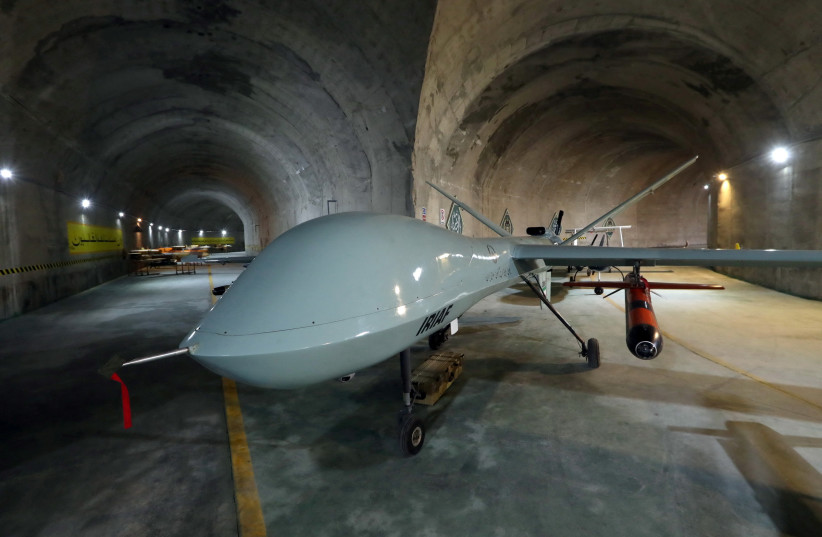In a hint to possible Israeli involvement in the recent assassination of an Iranian military officer, Prime Minister Naftali Bennett said on Sunday that Tehran would not go unpunished for instigating attacks through its proxies.
“As we have said more than once, the era of immunity for the Iranian regime is over,” Bennett told his ministers at the weekly government meeting.
Last week, two people on a motorcyle assassinated Islamic Revolutionary Guard Corps Col. Hassan Sayad Khodayari while he sat in his car. The tactic echoed previous killings in Iran that focused on nuclear scientists and were widely pinned on Mossad.
The New York Times reported that Israel had informed the United States it was behind the hit.
Israel has been on high alert over the last week amid concern that Iran will try to retaliate for Khodayari’s death.

Bennett, in his remarks to the weekly government meeting, took a firm stance against Iran.
“For many years, the Iranian regime has carried out terrorism against Israel and the region via proxies but for some reason the head of the octopus – Iran itself – has enjoyed immunity,” Bennett said.
“As we have said more than once, the era of immunity for the Iranian regime is over,” he emphasized.
“Those who finance terrorists, those who arm terrorists, and those who send terrorists – will pay the full price.”
In another attack on Thursday, an Iranian engineer was killed in an explosion said to have been caused by drones carrying explosives at the Parchin military base, where Iran has allegedly conducted nuclear weapons tests.
Bennett also attacked Iranian denials that it had a nuclear weapons program and that it had not pursued such programs in the past.
He referenced a story published last week in The Wall Street Journal claiming that a cache of 100,000 documents Israel spirited out of Tehran in 2018 included evidence that the Islamic Republic had used reports from the International Atomic Energy Agency to hide its former nuclear program.
“Iran has also been investing in lies such as its deliberate misleading of the IAEA in order to evade visits by the agency, as was revealed last week. The Iranian regime is based on tyranny, terror and lies,” Bennett stated.
During the meeting, Bennett condemned the Iranian government’s actions against its own people, including during street protests against the Islamic Republic, as he urged the international community to stand behind the people of Iran.
“The world must stand alongside the Iranian people and stand up against the brutal regime,” Bennett added.
He spoke as Iranian police used tear gas and fired shots in the air to disperse protesters during the weekend over a deadly building collapse in the southwestern city of Abadan.
Unverified footage on social media showed people running for cover. Screams of “Don’t shoot, don’t shoot” and the sound of gunfire could be heard.
In Khuzestan’s port city of Mahshahr, unverified videos showed protesters shouting, “They stole oil and gas, took our blood.”
Marches in solidarity with the Abadan protests have also been held in several nearby areas in Khuzestan, Shahin Shahr in central Iran and the southern city of Shiraz, according to other unverified postings on social media.
“Last week, masses of Iranian people went out into the streets of Abadan and other places in Iran to demonstrate against the tyranny of the regime,” Bennett said.
“In response, Iranian forces shot at Iranian civilians. In many places in Iran at the moment it is difficult to acquire water and bread at a reasonable price. Iran invests in terror – like the underground UAV base they showcased recently.”
Bennett spoke in advance of a visit to Washington this week by an Israeli delegation led by National Security Adviser Eyal Hulata to discuss options should talks to revive the 2015 Iran nuclear deal fail.
They are also likely to discuss next week’s IAEA Board of Governors’ Meeting in Vienna and the possibility of a resolution condemning Iran.
At the World Economic Forum last week, IAEA Director-General Rafael Grossi said Iran’s nuclear program was “big and ambitious” and that its uranium enrichment was close to weapons grade.
There are also questions with regard to full Iranian disclosure of information regarding its program, Grossi said.
“We found traces of uranium in places where no uranium should be,” he explained.
Iran’s nuclear program is not the only concern. On Saturday, Iran revealed images from an underground secret drone base that it operates. State TV said 100 drones were being kept in the heart of the Zagros mountains, including Ababil-5, which it said were fitted with Qaem-9 missiles, an Iranian-made version of air-to-surface US Hellfire.
Reuters and Maariv contributed to this report.
